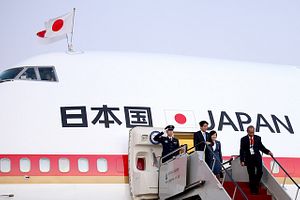Japanese Prime Minister Shinzo Abe’s attendance at the APEC summit in Beijing this November is shaping up to be a busy affair. While Abe has been noted for his many state visits abroad, more than any other Japanese prime minister, he has hit a road block in meeting a few key regional leaders. In spite of this, the Japanese government is doing everything in its power to facilitate Abe’s first meeting with Chinese President Xi Jinping, as well as setting up another visit with Russian President Vladimir Putin; Abe’s first since Russia’s annexation of Crimea during the ongoing crisis in Ukraine.
While Putin was slated to visit Tokyo at some point his this fall, the trip has become less and less likely as Russia’s involvement in Ukraine has become more apparent and Japan has increased its sanctions on Moscow to show solidarity with its G7 allies. Yet even though Putin’s visit will likely be postponed indefinitely, the two countries are intent on maintaining a baseline of relations in order to continue discussions on the resolution of disputed islands and possible new energy deals.
On Sunday, Putin and Abe spoke with each other over the phone. Local media reported on the fact that Putin’s visit is becoming increasingly unlikely, yet the two expressed interest in holding a summit. According to Japanese state broadcaster NHK, it was Abe who said “he was hoping to hold such a meeting on the sidelines of the APEC meeting in Beijing in November.” The two leaders also spoke about the Ukrainian situation, with Abe explaining Japan’s position and its emphasis on “the importance of the rule of law.”
The two spoke after government sources told the press last Friday that Japan plans to bolster its sanctions against Russia to bring them more in line with the U.S. and its other Western allies. However, the call took place on Abe’s 60th birthday, and at the request of Moscow. The Japan Times speculates that the call was probably Putin’s way of discerning Tokyo’s new position toward Russia after the news of further sanctions was publicized.
Alongside the phone call with Putin, a large annual Japanese business delegation embarked for China on Monday. The senior executives of more than 200 corporations will be visiting Beijing. The delegates of the Japan-China Economic Association are asking to meet with either Xi or Premier Li Keqiang, although they were denied an audience during their trip last November. Included among the group are the honorary chairman of Toyota Motor Corp Fujio Cho and the head of Japan’s largest business lobby (the Keidanren), Sadayuki Sakakibara, who said earlier this month that “We’d like to contribute to creating an environment that will enable a summit” between Abe and Xi. In order to sweeten a possible meeting for Xi, the group is set to propose plans that could turn around the recent sharp decline in Japanese investment in China, as well as help China with its industrial modernization and increasing problems with pollution. According to the Jiji Press, the delegation has not met with the Chinese prime minister or any other high-ranking officials in the last four years.
Abe has been using all available diplomatic means since the beginning of this summer to entice Xi into a sideline meeting in November. There have been reports that former Prime Minister Yasuo Fukuda met quietly with Xi in early August to discuss the possibility of the summit, and Xi for his part has made noncommittal statements that nevertheless indicate he is open to the idea.
In relation to Putin, both sides appear anxious to meet, yet the two month interim period could see any number of events which might preclude it, most completely outside Tokyo’s control. The fact that the APEC meeting is in a neutral location will help facilitate talks. Even the U.S. and its allies in Europe realize that having Japan as a potential go between is beneficial, especially since the issues Tokyo and Moscow seek to settle have little to do with Ukraine.
Abe’s meeting with Xi remains the most difficult and potentially beneficial of the premier’s long list of bilateral get togethers. Meeting with the Chinese president without formally acknowledging the dispute over the Senkaku/Diaoyu islands or reaffirming Japan’s guilt for its atrocities during the Second World War would be a major political coup for Abe. Japan does not look likely to change its position on either issue before the summit, yet both sides have recently shown a willingness to temporarily put aside their nationalist issues in order to improve their once vibrant economic ties.

































